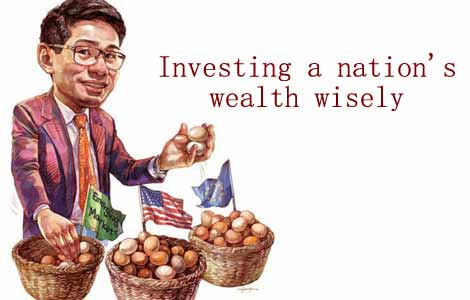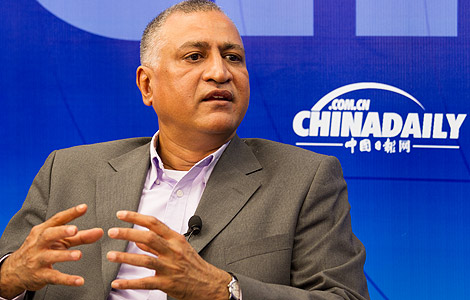Food security is everyone's issue
Updated: 2013-09-30 11:05
By Michael Barris (China Daily)
|
||||||||
A reflection of China's newfound wealth has been its lifting 500 million people out of poverty since 2000.
That's a statistic that Patrick Ho, the China Energy Fund Committee's secretary general and Hong Kong's former Secretary for Foreign Affairs, highlighted during his address to a United Nations meeting this week on sustainability. It was held for nations' representatives to report their progress in meeting Millennium Development Goals (MDG) established by the UN in 2000, targeting such problems as world hunger, with a 2015 deadline.
In his speech, Ho praised the goals' existence but said the "prolonged global economic slump and violent global conflicts" have "exacerbated poverty and inequality, posing challenges" to the ability to sustain the results. "Perhaps," Ho asked rhetorically, "a lesson learned from the current process should be how to sustain our efforts in achieving the MDG? Did we just treat the symptoms without eradicating the root of the problems?"
Ho told the delegates that nations' efforts to meet the MDGs often have focused on the "underprivileged". Here he was alluding to UN reports showing that although developed countries have boosted funding to achieve the goals, more than half the aid has been for debt relief owed by poor countries, natural disaster relief and military aid, which do not further development.
Saying "broad public participation is a fundamental prerequisite to achieve sustainable development", Ho called on developed countries to rally their "affluent multitudes" into action.
Consumption, Ho said, should "cater to what we need rather than what we want and desire, for desires can be insatiable and have no limits." The "spirit of sustainability", Ho said, "warns against greed, and calls for moderation." He called on the UN to formulate "a set of specific goals on changing our unsustainable lifestyle".

Ho's deep view of sustainability dovetails with David Nabarro's characterization of the battle to end food waste as "everybody's responsibility."
"It's not just the consumer," Nabarro, special representative of the UN secretary general for food security and nutrition, told China Daily on the sidelines of a UN panel on food waste last week. "It's right up and down the chain. It's what happens on the farm, or even before the farm, it's getting water or fertilizers to the farm. Then it's on the farm or in the fish pond or in the cowshed. And then it's in the processing chain. And then it's in the retail place, not just supermarkets, but actually all aspects of retailing and then it's in the home."
The point is "bringing everybody together to value food properly," he said. "It's about renewing, it's about valuing. It's about real positive elements. It's not about taking our waste and giving it to charities. That's only half the story."
Nabarro singles out China for fighting food waste through such campaigns as "Clear Your Plate", in which participants snap a photo of their cleared plate and post it on a social media site. "China's leaders, they're walking the walk and not just talking the talk," Nabarro said. "Let China show the rest of us how you get this right. It's doing it decades quicker than the rest of the world has done it."
China's efforts to control food waste were born out of necessity. Although 128 million Chinese live below the poverty line and often lack sufficient food, more than $32 billion of food is thrown away in China annually, according to WorldWatch Institute. Those numbers prompted the city of Beijing to begin implementing garbage sorting and food scrap recycling in 2000. The Beijing Municipal Garbage Management Ordinance came into force in March 2012, encouraging communities and households to participate in kitchen-waste recycling. China's five-year plan has identified food security, food safety, productivity and waste reduction as challenges to overcome for China to achieve its goal of 95 percent self-sufficiency in basic foodstuffs by 2020.
But the motive is unimportant. As long as the principle of sustainability, in Ho's words, can be "incorporated into our daily lives and manifested in our every deed and action", its continuation can be assured.
As Ho told the UN, sustainability "should not be just a slogan, a policy or a campaign. It should be our way of life."
Contact the writer at michaelbarris@chinadailyusa.com
(China Daily USA 09/30/2013 page2)

 Investing a nation's wealth wisely
Investing a nation's wealth wisely
 This China Dream
This China Dream
 Williams, Li into second round at China Open
Williams, Li into second round at China Open
 Visible face of CIC investment
Visible face of CIC investment
 Up, up, Huawei finds new friends in Europe nations
Up, up, Huawei finds new friends in Europe nations
 Yuxi to shield Fuxian Lake by creating wetland area
Yuxi to shield Fuxian Lake by creating wetland area
 A man with passion for China
A man with passion for China
 American batman soars through Chinese mountain
American batman soars through Chinese mountain
Most Viewed
Editor's Picks

|

|

|

|

|

|
Today's Top News
China calls on APEC to promote FTA integration
Japan, US kicks off 2nd round of TPP-related talks
Website launched to assist expat professionals
50 foreign experts honored with Friendship Awards
Academic warns Obama on Pacific policy
Shanghai opens free trade zone
NSA mapping networks of citizens
Little-known now, but a big future
US Weekly

|

|







